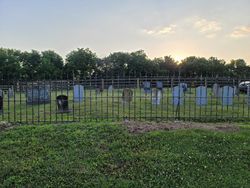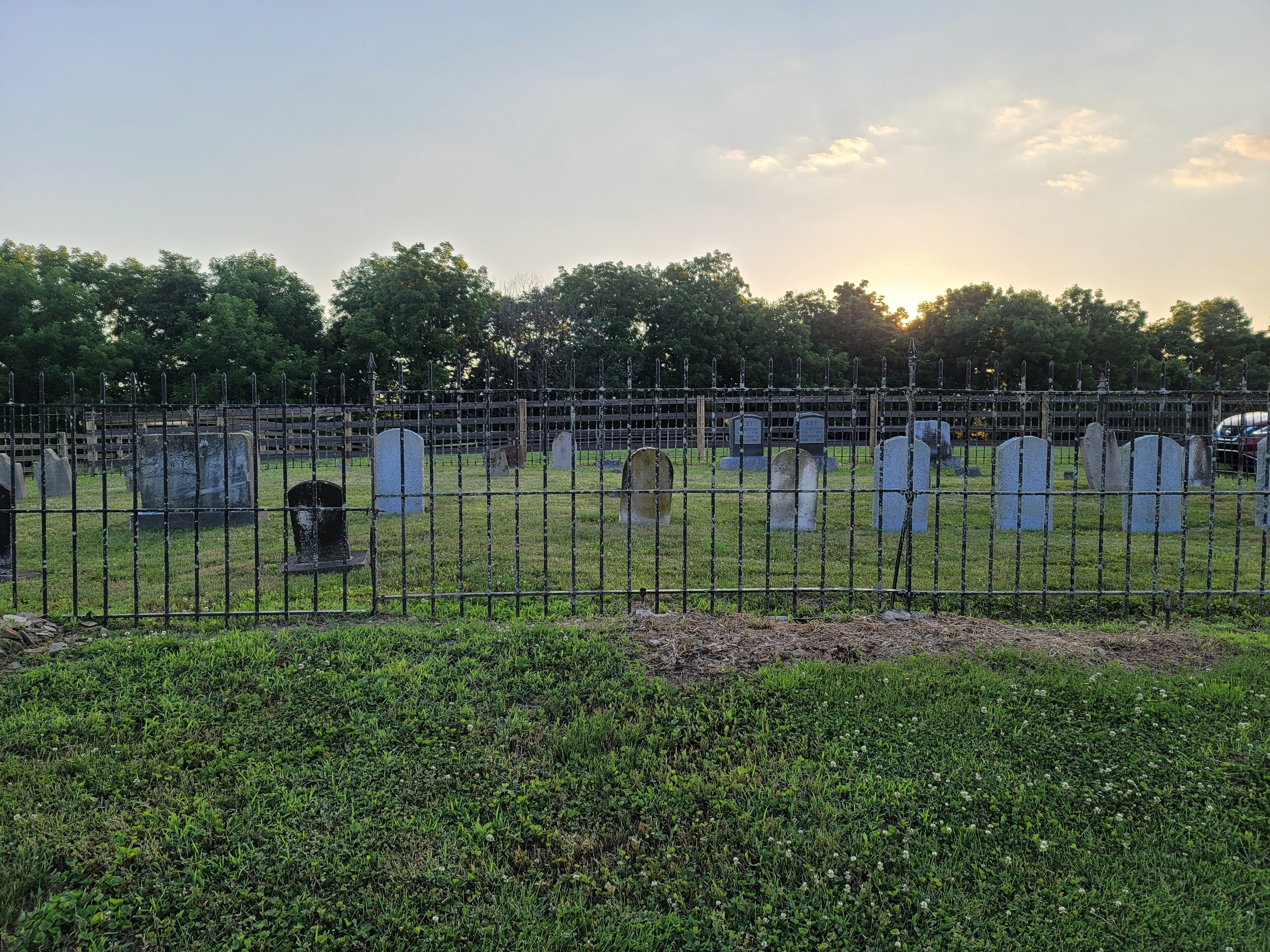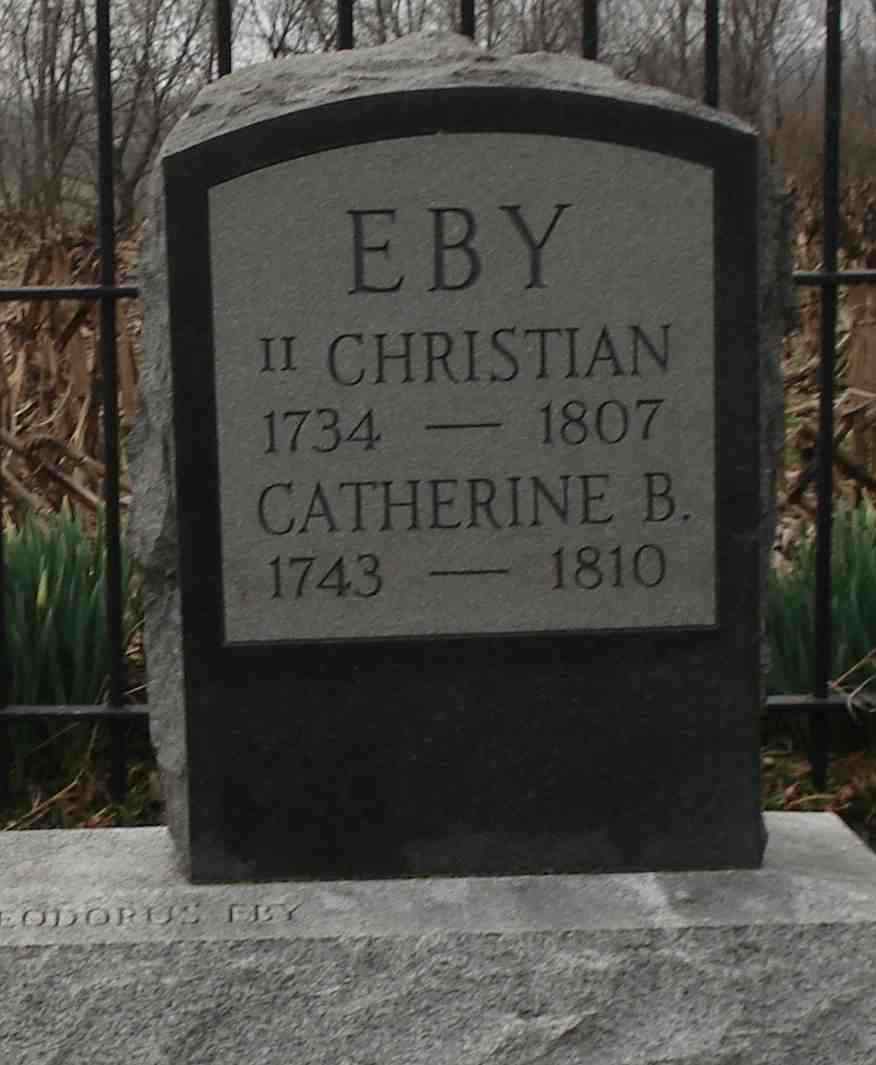Christian (Jr.) was just 22 when his father died, but he assumed leadership of the family by petitioning the Orphan's Court for the right to purchase his father's properties, including the mill and plantation. The court agreed on the condition that he pay £1400 to his siblings. By 1760 he had assumed responsibility for the property and his younger siblings.
According to biographical material presented by Ezra Eby in his "History of the Eby Family," Christian improved the homestead and allowed its use for Mennonite meetings until the Hammer Creek Meetinghouse was erected.
Ezra Eby also recounts that Revolutionary War foragers took horses and cattle as well as grain from his mill, and on one occasion removed Catherine's pewter, spoons and fresh-baked bread and pies from the house. Further, Christian (Jr.) is credited with supplying food and other supplies to soldiers quartered nearby. It is on the basis of these contributions that many descendants claim membership in the Daughters of the American Revolution. As a traditional Mennonite, Christian (Jr.) would not have sworn allegiance to the new government or otherwise actively participated in the Revolution.
Christian (Jr.) grew to the position of Elder in his Mennonite community. His great-grandson, Simon P. Eby, reported that he was strict in his ways, including not letting his children learn English because they might become "proud."
In his "Mennonites of the Lancaster Conference," M. G. Weaver pointed out: "This venerable leader of the Church has been erroneously called a bishop instead of a deacon, which no doubt was started by some one not familiar with the terms of officers or servants in the Mennonite Church and unthinkingly copied and often repeated by historians and others without investigation." He further stated that "there was no bishop district wherein he (Christian Eby Jr.) lived until thirty-one years after his death."
Christian and his wife Catherine are buried with other family members in the graveyard at the top of the hill overlooking the homestead. In addition to the children linked below, they were the parents of Andreas Eby (Oct. 27, 1769- May 12, 1809) married to Elizabeth Stauffer. After Andrew's death, Elizabeth remarried.
---Bio by Denise Witwer Lahr with input from kw (Member # 48358814)
Christian (Jr.) was just 22 when his father died, but he assumed leadership of the family by petitioning the Orphan's Court for the right to purchase his father's properties, including the mill and plantation. The court agreed on the condition that he pay £1400 to his siblings. By 1760 he had assumed responsibility for the property and his younger siblings.
According to biographical material presented by Ezra Eby in his "History of the Eby Family," Christian improved the homestead and allowed its use for Mennonite meetings until the Hammer Creek Meetinghouse was erected.
Ezra Eby also recounts that Revolutionary War foragers took horses and cattle as well as grain from his mill, and on one occasion removed Catherine's pewter, spoons and fresh-baked bread and pies from the house. Further, Christian (Jr.) is credited with supplying food and other supplies to soldiers quartered nearby. It is on the basis of these contributions that many descendants claim membership in the Daughters of the American Revolution. As a traditional Mennonite, Christian (Jr.) would not have sworn allegiance to the new government or otherwise actively participated in the Revolution.
Christian (Jr.) grew to the position of Elder in his Mennonite community. His great-grandson, Simon P. Eby, reported that he was strict in his ways, including not letting his children learn English because they might become "proud."
In his "Mennonites of the Lancaster Conference," M. G. Weaver pointed out: "This venerable leader of the Church has been erroneously called a bishop instead of a deacon, which no doubt was started by some one not familiar with the terms of officers or servants in the Mennonite Church and unthinkingly copied and often repeated by historians and others without investigation." He further stated that "there was no bishop district wherein he (Christian Eby Jr.) lived until thirty-one years after his death."
Christian and his wife Catherine are buried with other family members in the graveyard at the top of the hill overlooking the homestead. In addition to the children linked below, they were the parents of Andreas Eby (Oct. 27, 1769- May 12, 1809) married to Elizabeth Stauffer. After Andrew's death, Elizabeth remarried.
---Bio by Denise Witwer Lahr with input from kw (Member # 48358814)
Family Members
-
![]()
Elizabeth Eby Bucher
1762–1832
-
![]()
Christian Bricker Eby
1763–1824
-
![]()
Rev Peter Eby
1765–1843
-
![]()
Johannes "Hannes" Eby
1767–1845
-
![]()
Catharine Eby Burkholder
1771–1856
-
![]()
Barbara Eby Schneider
1774–1843
-
![]()
Anna Eby Wissler
1777–1829
-
![]()
George Eby
1779–1793
-
Maria Eby
1781–1783
-
![]()
Benjamin Eby
1785–1853
-
![]()
Maria Eby Brubacher
1787–1864






















